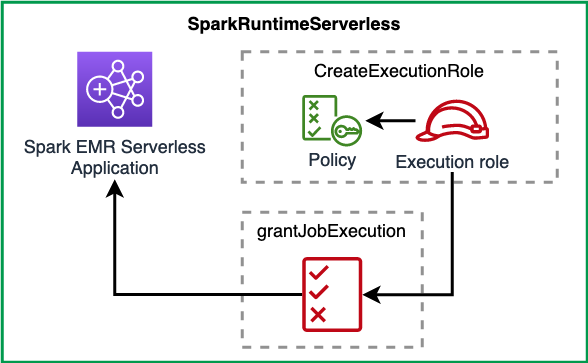Spark EMR Serverless Runtime
A Spark EMR Serverless Application with IAM roles and permissions helpers.
Overview
The construct creates a Spark EMR Serverless Application, with the latest EMR runtime as the default runtime. You can change the runtime by passing your own as a Resource property to construct initializer. It also provides methods to create a principal or grant an existing principal (ie IAM Role or IAM User) with the permission to start a job on this EMR Serverless application.
The construct creates a default VPC that is used by EMR Serverless Application. The VPC has 10.0.0.0/16 CIDR range, and comes with an S3 VPC Endpoint Gateway attached to it. The construct also creates a security group for the EMR Serverless Application. You can override this by defining your own NetworkConfiguration as defined in the Resource properties of the construct initializer.
The construct has the following interfaces:
- A construct Initializer that takes an object as
Resource propertiesto modify the default properties. The properties are defined inSparkEmrServerlessRuntimePropsinterface. - A method to create an execution role for EMR Serverless. The execution role is scoped down to the EMR Serverless Application ARN created by the construct.
- A method that takes an IAM role to call the
StartJobRun, and monitors the status of the job.
The construct has the following attributes:
- applicationArn: EMR Serverless Application ARN
- applicationId: EMR Serverless Application ID
- vpc: VPC is created if none is provided
- emrApplicationSecurityGroup: security group created with VPC
- s3GatewayVpcEndpoint: S3 Gateway endpoint attached to VPC
The construct is depicted below:

Usage
The code snippet below shows a usage example of the SparkEmrServerlessRuntime construct.
- TypeScript
- Python
class ExampleSparkEmrServerlessStack extends cdk.Stack {
constructor(scope: Construct, id: string) {
super(scope, id);
const runtimeServerless = new dsf.processing.SparkEmrServerlessRuntime(this, 'SparkRuntimeServerless', {
name: 'spark-serverless-demo',
});
const s3ReadPolicyDocument = new PolicyDocument({
statements: [
PolicyStatement.fromJson({
actions: ['s3:GetObject'],
resources: ['arn:aws:s3:::bucket_name'],
}),
],
});
// The IAM role that will trigger the Job start and will monitor it
const jobTrigger = new Role(this, 'EMRServerlessExecutionRole', {
assumedBy: new ServicePrincipal('lambda.amazonaws.com'),
});
const executionRole = dsf.processing.SparkEmrServerlessRuntime.createExecutionRole(this, 'EmrServerlessExecutionRole', s3ReadPolicyDocument);
runtimeServerless.grantStartExecution(jobTrigger, executionRole.roleArn);
new cdk.CfnOutput(this, 'SparkRuntimeServerlessStackApplicationArn', {
value: runtimeServerless.application.attrArn,
});
}
}
class ExampleSparkEmrServerlessStack(cdk.Stack):
def __init__(self, scope, id):
super().__init__(scope, id)
runtime_serverless = dsf.processing.SparkEmrServerlessRuntime(self, "SparkRuntimeServerless",
name="spark-serverless-demo"
)
s3_read_policy_document = PolicyDocument(
statements=[
PolicyStatement.from_json({
"actions": ["s3:GetObject"],
"resources": ["arn:aws:s3:::bucket_name"]
})
]
)
# The IAM role that will trigger the Job start and will monitor it
job_trigger = Role(self, "EMRServerlessExecutionRole",
assumed_by=ServicePrincipal("lambda.amazonaws.com")
)
execution_role = dsf.processing.SparkEmrServerlessRuntime.create_execution_role(self, "EmrServerlessExecutionRole", s3_read_policy_document)
runtime_serverless.grant_start_execution(job_trigger, execution_role.role_arn)
cdk.CfnOutput(self, "SparkRuntimeServerlessStackApplicationArn",
value=runtime_serverless.application.attr_arn
)